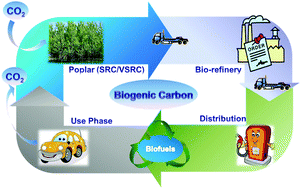The environmental profile of bioethanol produced from current and potential future poplar feedstocks in the EU†
Abstract
Although biofuels have the potential for mitigating climate change and enhancing energy security, controversy regarding their overall environmental sustainability is considered a significant bottleneck in their development at both global and EU levels. Life Cycle Assessment (LCA) was applied to model the current and prospective environmental profiles for poplar-derived bioethanol across various potential EU supply chains (different poplar plantation management, different pretreatment technologies for bioethanol production, five EU locations). LCA modelling indicated that E100 (100% bioethanol) and E85 (85% bioethanol, 15% petrol) fuels derived from Poplar from various locations in the EU had environmental impact scores some 10% to 90% lower than petrol in global warming potential, abiotic depletion potential, ozone depletion potential and photochemical oxidation potential depending upon the exact poplar supply chain and conversion technology modelled. Hybrid poplar clones with higher biomass yields, modified composition and improved cell wall accessibility had a clear potential to deliver a more environmentally sustainable lignocellulosic biorefining industry with environmental scores some 50% lower than with conventional poplar feedstocks. A particular aspect of the present study that warrants further research is the contribution that soil carbon accumulation can make to achieving low-GHG fuels in the future.


 Please wait while we load your content...
Please wait while we load your content...